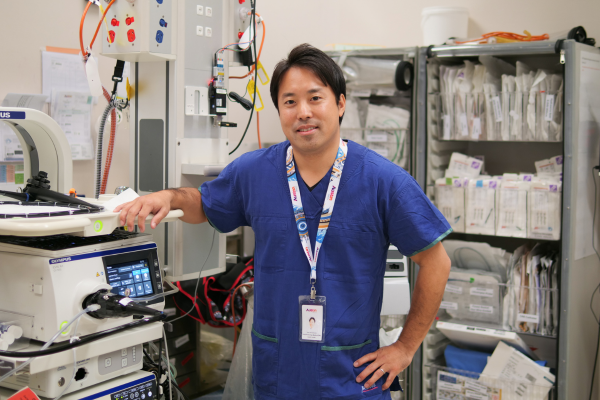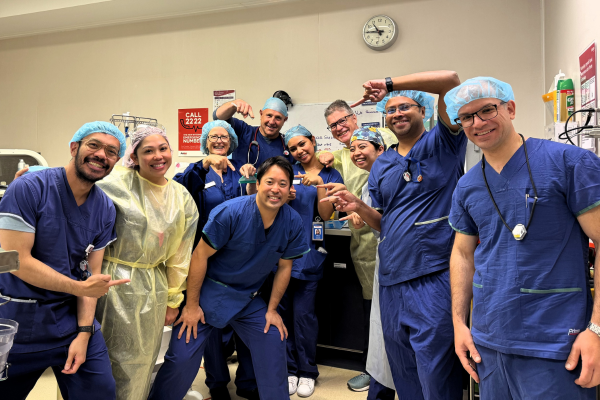About
Meet Dr Yuto Shimamura
- Home
- About
- Latest news
- Meet Dr Yuto Shimamura

23 December 2024
Austin Health is proud to welcome Dr Yuto Shimamura to our Advanced Endoscopy team!
A gastroenterologist and endoscopist with a passion for innovation, Dr Shimamura brings a wealth of international expertise to our organisation. Originally from Japan, he has honed his skills in advanced therapeutic endoscopy and is dedicated to expanding access to cutting-edge minimally invasive procedures, including the revolutionary field of third-space endoscopy.
We had a chat with Yuto to find out a bit more about him.
Tell us a bit about yourself!
My medical journey began at St. Luke’s International Hospital in Tokyo, where I completed my residency in gastroenterology. I further refined my skills in therapeutic endoscopy at St. Michael’s Hospital, University of Toronto. Most recently, I worked at Showa University in Tokyo, a world-renowned centre for digestive diseases headed by the legendary endoscopist Dr. Haruhiro Inoue. There, I had the privilege of leading clinical innovations and mentoring fellows from Japan and around the world, training the next generation of specialists in advanced endoscopic techniques. At Austin Health, my goal is to expand the availability of these procedures, improving patient outcomes, and contribute to the growth of minimally invasive endoscopy.
Outside of work, I enjoy spending time with my family. I love playing tennis, especially with my kids - it’s a great way for us to stay active and have fun together. My family and I also enjoy travelling. As newcomers to Melbourne, we are eager to explore the city and its surroundings and discover the unique experiences Australia has to offer.
What excites you most about joining Austin Health and its Interventional Endoscopy team?
I am thrilled to join Austin Health, a leader in medical innovation and patient care, as part of the esteemed Advanced Endoscopy team led by Dr. Rhys Vaughan. With the support of skilled therapeutic endoscopists, an incredible team of nurses and administrative staff, and access to cutting-edge facilities, this is the perfect environment to refine current techniques and introduce advanced procedures like ‘third-space endoscopy’. What excites me most is the chance to offer patients minimally invasive treatments that can make a real difference in their quality of life. The rapid advancements in this field continue to push boundaries, and I am eager to contribute to this progress.
How has your international experience shaped your approach to endoscopic procedures?
My international experience has been invaluable in shaping my approach to endoscopy. In Japan, I developed skills in advanced therapeutic endoscopic procedures like endoscopic submucosal dissection (ESD) and third-space endoscopy. In Toronto, I integrated these technical skills and contributed to developing advanced endoscopy programs, which taught me how to adapt innovative techniques to different healthcare systems. These experiences have helped me cultivate a versatile and patient-centered approach, blending the best global practices to provide personalized, high-quality care for every patient.
You have mentioned third-space endoscopy. What exactly is it?
Third-space endoscopy is a cutting-edge, minimally invasive technique that allows access to the submucosal space of the gastrointestinal tract—referred to as the “third space” because it extends beyond the traditional lumen and peritoneal spaces. This approach enables treatments that were previously only achievable through surgery. Using third-space endoscopy, we can perform advanced procedures such as:
- POEM (Peroral Endoscopic Myotomy): Treats esophageal motility disorders like achalasia by cutting the esophageal muscles.
- Gastric POEM (G-POEM): Targets gastroparesis by cutting the muscle of the pyloric sphincter.
- Zenker’s POEM (Z-POEM): Provides an endoscopic solution for hypopharyngeal diverticulum, also known as Zenker’s diverticulum.
- POET (Peroral Endoscopic Tumor Resection): Removes submucosal lesions from the gastrointestinal tract, including benign and malignant tumors.
The advantages of third-space endoscopy for patients are substantial: reduced invasiveness, shorter recovery times, lower risk, and more effective alternatives to conventional surgical interventions.
What message would you like to share with patients and clinicians about the options available at Austin Health?
At Austin Health, we are proud to offer some of the most advanced and minimally invasive endoscopic treatments available today, with the goal of enhancing patient outcomes and quality of life. From managing complex motility disorders to providing state-of-the-art care for early gastrointestinal cancers, our team combines technical expertise with compassionate care. I encourage both patients and clinicians to explore these minimally invasive options. By working together, we can set new standards in gastrointestinal care and continue to advance this field. I look forward to collaborating with the local and broader community to continually advance patient care.



